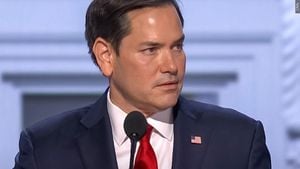With winter fast approaching, the United Kingdom is facing growing tensions surrounding cuts to winter fuel payments for pensioners, prompting various stakeholders to voice their concerns. The government’s policy shift not only threatens the financial stability of elderly citizens but also invites scrutiny and potential legal challenges from unions and local councils.
Recent debates have shed light on the dire circumstances many pensioners find themselves in as the colder months loom. Critics argue these cuts could push vulnerable individuals to the brink, making it increasingly difficult for them to afford heating and other basic necessities. The Unite union has emerged as one of the loudest opponents of these changes, warning of the potential fallout for older citizens who depend on this financial aid to survive.
With reports estimating losses of £100 to £300 annually, nearly 10 million pensioners are projected to be adversely affected by the changes instituted by the Department for Work and Pensions (DWP). Unite's general secretary, Sharon Graham, argued this policy unfairly targets those already struggling, allowing the government to “pick the pockets of pensioners,” which could have disastrous consequences as temperatures dip.
The backdrop for these adjustments stems from a £22 billion public finance deficit the government is grappling with. The decision to scale back these payments was presented as part of broader budget cuts aimed at addressing this fiscal gap, but the ramifications for those on fixed incomes are significant. Among the most alarming aspects of the government’s directive is the seemingly lack of impact assessments created to gauge how these cuts would disproportionately harm the elderly.
At the local government level, East Ayrshire councillors echoed this sentiment. Many voiced their deep concern over the potential withdrawal of winter fuel payments, which they argue have historically played a pivotal role in preventing excess winter deaths. Councilor Neal Ingram has taken the initiative to call on Westminster to cease these changes until thorough evaluations can take place. According to him, linking the winter fuel payments to pension credit eligibility could leave many pensioners at risk, as authorities estimate hundreds of thousands are not claiming the benefits to which they are entitled.
Data suggests over 800,000 households across the UK fail to claim pension credit. More disturbing is the notion presented by critics, including Councillor McFadzean, who branded the government’s actions as “cruel” and “dangerous”. With individuals living just above the poverty line set to miss out on necessary aid, concerns mount about the impossible choices they might face this winter: heating their homes or affording food.
A significant demographic tying back to these debates includes those who may feel they do not qualify for additional support due to their savings or home ownership. Yet, these pensioners often require assistance during winter months when energy costs soar. Councillors outlined the heavy financial burden placed on those earning even slightly above the threshold to qualify for aid. A radical policy adjustment could drive these households to make dire sacrifices, leading to heartbreakingly literal decisions between heating or eating.
Meanwhile, the government maintains its stance on supporting the elderly via alternative schemes. Liz Kendall, Secretary of State for Work and Pensions, noted the department is launching one of the most extensive outreach drives ever aimed at ensuring pensioners are aware of their benefits, contacting approximately 120,000 households on housing benefits who may qualify for pension credit.
Despite such measures, many remain unconvinced of the adequacy of support being provided. The DWP reports more than 760,000 eligible individuals are still unclaimed for Pension Credit during this uptick, leading to speculation about the efficacy of government communication strategies.
Public reaction is mixed, with many expressing anger over the decision to cut aid versus those optimistic about the proposed outreach programs. Advocacy groups have called for increased engagement to address misconceptions about who qualifies for financial aid and are pushing for easier access to relevant information.
Moving forward, the dialogue surrounding winter fuel payments has become not merely political but deeply personal. This situation has highlighted how financial struggles affect the daily realities of pensioners, many of whom face the combined pressure of fixed incomes, surging energy prices, and social isolation during the winter months.
The decisions made today will shape how future policies handle economic challenges without sacrificing the wellbeing of the elderly. With the prospect of legal action looming and community leaders pushing back against the cuts, there is uncertainty over how these changes will play out as public scrutiny continues.
Until then, one thing remains clear: the outcomes will not only impact budgets and balances but the very lives and livelihoods of some of the country's most vulnerable citizens.



